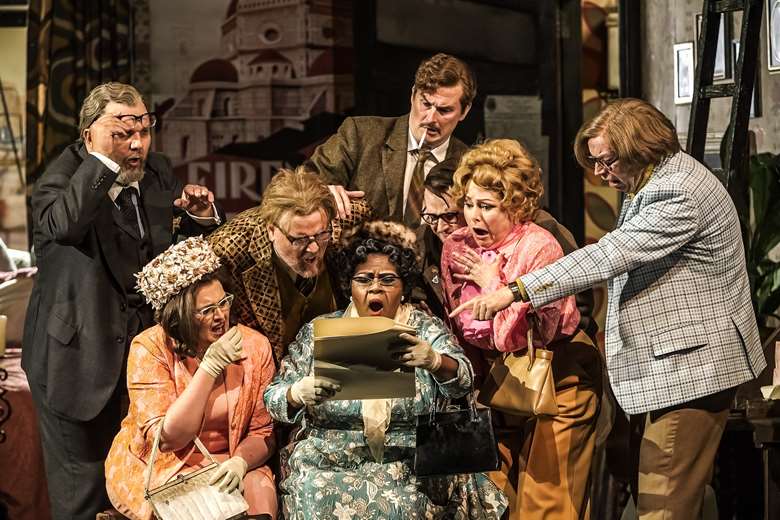The Long View | The tragedy of Welsh National Opera’s decline
Andrew Mellor
Tuesday, July 23, 2024
As the company crashes and burns in slow motion, Andrew Mellor argues that those outside Wales must fight the urge to look away

Before sitting down to write this, I glance at the record shelves behind me and decide what to listen to. A no-brainer; Charles Mackerras conducting Jenůfa with Welsh National Opera (WNO) in 2004. An orchestra on blazing form yet capable of extreme inter-sectional telepathy. A hearty chorus, ebullient yet full of stylistic nous. Soloists, led by company stalwart Janice Watson, who could be bettered for glamour but hardly for artistry. A conductor whom any opera company in the world would have cherished, but who cleaved to WNO. All that excellence and expertise… well, we know where that gets you these days.
It’s gratifying to write those words, because I never really got to review WNO as a critic. Maybe that was for the best. WNO was always a bit too close to home. I saw my first opera courtesy of the company: Giles Havergal’s Figaro at the Bristol Hippodrome in the Spring of 1995. Nine months later, I doubled my tally with Tim Albery’s still-memorable staging of Nabucco at the Theatre Royal in Plymouth, my hometown. I was soon tearing tickets and working the bars at that theatre, in the hope of glimpsing as many WNO productions as possible.
How different things look now, as WNO musicians ballot on strike action. As opera proves the release valve for the UK’s longstanding suspicion of the arts, Welsh National Opera is apparently taking one (or a good few, in fact) for the whole musical and theatrical team. The irony is immeasurable. No matter what camp you imagine yourself in – anti-London, anti champagne culture, anti grand colonnaded opera houses, anti paying megabucks for peripatetic stars – WNO wouldn’t be an obvious target for your wrath. The majority of its performances take place in normal theatres up and down the land, sandwiched between panto, musicals and stand-up. The company is liable for few of the major criticisms levied at the opera world, with varying degrees of justification, by politicians and their quangos. And yet, as revealed by Hugh Morris’s investigation for VAN magazine last month, the company has been bullied into an acquiescent silence concerning its forced transformation into a shadow of its former self.
At this point, it’s difficult not to get emotionally involved. In a foreign land where opera is thriving, I try to disconnect. Then my television shows me John Thaw as Inspector Morse, sitting in his police station under posters for WNO productions I saw in Plymouth. That’s when I tell myself it’s worth writing more about WNO and its plight.
Only WNO and Glyndebourne brought full-scale opera to Devon, England’s second biggest county and one chronically underserved by the arts. Now only WNO is left. Few would put money on that arrangement lasting. If it disappears, you can forget about a whole swathe of the citizenry even knowing what opera is. So much for reach and diversity. Meanwhile, privatised opera thrives – marketing itself on privilege and separation, clinging to the Home Counties – a world away from Cornwall, Devon, Cumbria and Norfolk. You don’t have to be a class warrior to worry deeply about everything that implies, even if you admire what those companies do on stage.
All that fades into an odd sort of half-irrelevance, though, when you consider the decisions being made inside the Land of Song. Naively, I always believed Wales, the Latvia of Western Europe, would rally round one of its most cherished traditions and recognizable exports. But apparently those things count for nothing in Welsh politics. In more optimistic moments, I conclude that nobody actually wanted this; that the crippling of WNO is the result of a convergence of disconnected decisions and difficult situations – a case of distraction-born neglect rather than wanton destruction.
Then I think again. In cahoots, the Arts Councils of England and Wales seem determined to undermine the company. One of Wales’s beacons of excellence, tradition and soft-power – an outstanding yet nimble national theatre company that had sufficient enterprise to begin building sets for TV blockbusters like Doctor Who. Dozens of livelihoods are in peril and the human experience across huge chunks of Wales and England is set to be impoverished. Rather than help mitigate opera’s increasing social awkwardness, all this will fast-track it.
The last opera I saw before leaving the UK nine years ago was back at the Theatre Royal Plymouth. It was Richard Jones’s unspeakably beautiful production of Hänsel und Gretel, built and originated at WNO headquarters in Cardiff, but seen by even more at the Metropolitan Opera in New York, where on the first day of 2008 it was broadcast live around the world. That was Welsh work right there, being seen by millions on one of the world’s most iconic stages but only after it had already been seen in Cardiff, Swansea and Llandudno. Who could claim to have Wales’s best interests at heart, and sign-off on destroying all that?




